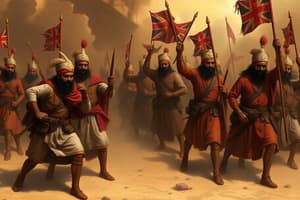Podcast
Questions and Answers
ব্রিটিশ ইস্ট ইন্ডিয়া কোম্পানির কি দায়িত্ব ছিল?
ব্রিটিশ ইস্ট ইন্ডিয়া কোম্পানির কি দায়িত্ব ছিল?
- আয় কালেক্ট করা
- বিচার প্রশাসন করা
- স্থানীয় রাজাদের সাথে সম্পর্ক রক্ষা করা (correct)
- সৈন্য অভিযান পরিচালনা করা
1858 সালে, পার্লামেন্ট কী আইন পারিত করে?
1858 সালে, পার্লামেন্ট কী আইন পারিত করে?
- ফ্রেন্চ ইস্ট ইন্ডিয়া কোম্পানির উন্মোচন
- ইন্ডিয়া-র অধিকারের বাধা
- ডাচ ইস্ট ইন্ডিয়া কোম্পানির সুরক্ষা
- ব্রিটিশ ইস্ট ইন্ডিয়া কোম্পানির দায়িত্ব মুখে খাওয়ানো (correct)
'The Great Rebellion' ঘটনা-টির ১৮৫৭-এর _-r' -? _? -' _-?
'The Great Rebellion' ঘটনা-টির ১৮৫৭-এর _-r' -? _? -' _-?
- _ '_ _-?_' _-?_ _-'
- '_ _?_ _- ?_'
- '_?_' _-?_ _-?_ ?_' (correct)
- '_ _- ?_ _-?'
'The Great Rebellion' -- ?_ - ১৮৫৭, ____ ____ ____ ___ ____?
'The Great Rebellion' -- ?_ - ১৮৫৭, ____ ____ ____ ___ ____?
'The Great Rebellion'-র _ --_ _--___- _______ __ _______, ______ ___ ______ _____ ____?
'The Great Rebellion'-র _ --_ _--___- _______ __ _______, ______ ___ ______ _____ ____?
'The Great Rebellion'-র ________ ________ __________ ________ ___________, _____ _______ _____ ________?
'The Great Rebellion'-র ________ ________ __________ ________ ___________, _____ _______ _____ ________?
ব্রিটিশ ইস্ট ইন্ডিয়া কোম্পানির স্থাপনার পেছনের ধারণাটি কোনটি?
ব্রিটিশ ইস্ট ইন্ডিয়া কোম্পানির স্থাপনার পেছনের ধারণাটি কোনটি?
ব্রিটিশ ইস্ট ইন্ডিয়া কোম্পানির ধিপ্রাপ্তির জন্য কোন কোম্পানির অনুমোদনের চার্টারের সাথে প্রারম্ভ?
ব্রিটিশ ইস্ট ইন্ডিয়া কোম্পানির ধিপ্রাপ্তির জন্য কোন কোম্পানির অনুমোদনের চার্টারের সাথে প্রারম্ভ?
১৭৫৭-এ 'Battle of Plassey'তে _
১৭৫৭-এ 'Battle of Plassey'তে _
'British East India Company'-র ১০০+ years-ের- _
'British East India Company'-র ১০০+ years-ের- _
'British East India Company'-র 'Bengal'-e political and military power exertion-er shurute _
'British East India Company'-র 'Bengal'-e political and military power exertion-er shurute _
'British East India Company'-r political influnce increase korar shomoy kothay established kore?
'British East India Company'-r political influnce increase korar shomoy kothay established kore?
Study Notes
British East India Company: Unpacking Its Impactful Legacy
For over two centuries, from its establishment in 1600 until it was dissolved by the British government in 1874, the British East India Company played a pivotal role in shaping global trade, colonialism, and political dynamics. To understand this historic organization's influence, let's delve into its history, accomplishments, and consequences.
Establishment & Trade Expansion (1600 - Mid 18th Century)
The British East India Company, often abbreviated as EIC, was founded with charters issued by Queen Elizabeth I as part of her strategy towards acquiring spices—a precious commodity highly sought after across Europe. As the company expanded its sphere of operations beyond spice trading, its reach spread through Asia, encompassing areas such as Java, Sumatra, China, Japan, and most notably, India. Through ruthless competition and strategic alliances, the EIC grew to become one of Britain's most powerful commercial enterprises, exercising considerable authority along the Indian coastline.
Political Influence (Late 18th – Early 19th Centuries)
With time, the British East India Company began to exert more politico-military power within territories they controlled, particularly in Bengal, where they established themselves following victory against French forces in the Battle of Plassey (1757). By the mid 19th century, their dominance had transformed them into what amounted to a semi-sovereign entity, responsible for maintaining relations with local rulers, collecting revenue, administering justice, and conducting military campaigns. This situation ultimately culminated in the infamous events known as 'the Great Rebellion,' which would eventually lead to British control over large parts of India.
Aftermath & Dissolution (Mid 19th Century - Late 19th Century)
Following the suppression of the rebellion of 1857, also referred to as the Sepoy Mutiny, the British government perceived the continued existence of the company as being detrimental to its control of India. Parliament passed an act in 1858 transferring all responsibilities related to governance from the British East India Company to the Crown, resulting in the end of the company's autonomy.
Despite its dissolution, however, the legacy of the British East India Company continues to shape discussions around imperialism, economic expansion, and the impact of European colonial empires like Britain upon Asian societies. Notably, its actions facilitated the flow of goods between continents, introduced new crops such as tea and opium, and fostered cultural exchange among diverse peoples; yet, these practices were accompanied by exploitation, dispossession, and social disruption that continue to reverberate today.
In conclusion, the story of the British East India Company is complex and multifaceted. From humble beginnings as a joint stock enterprise aimed solely at profiting from international commerce, the company evolved into a colossus whose actions shaped the course of human history worldwide. Despite its profound achievements, many regard the company as having left behind a shadow cast by destructive consequences, underscoring important lessons regarding the perils inherent to seemingly innocuous decisions made during periods of great expediency.
Studying That Suits You
Use AI to generate personalized quizzes and flashcards to suit your learning preferences.
Description
Explore the history, influence, and consequences of the British East India Company through this quiz. Learn about its establishment, trade expansion, political influence, dissolution, and lasting impact on imperialism and global trade dynamics.




